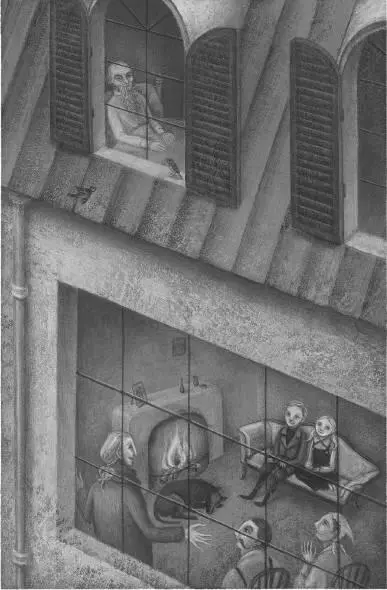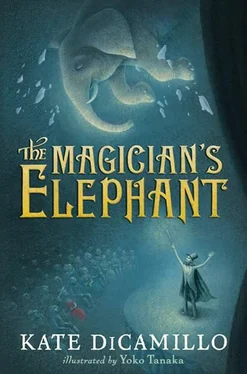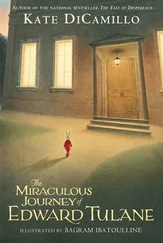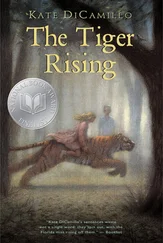And that, after all, is how it ended.
Quietly.
In a world muffled by the gentle, forgiving hand of snow.
Iddo slept in front of the fire when he came to visit.
And Tomas sang.
They did not ever, the two of them, stay for long.
But they visited often enough that Leo and Gloria and Peter and Adele learned to sing along with Tomas his strange and beautiful songs of elephants and truth and wonderful news.

Often, when they were singing, there came from the attic apartment a knocking sound.
It was usually Adele who went up the stairs to ask Vilna Lutz what it was he wanted. He could never answer her properly. He could only say that he was cold and that he would like the window to be closed; sometimes, when he was in the grip of a particularly high fever, he would allow Adele to sit beside him and hold his hand.
“We must outflank the enemy!” he would shout. “Where, oh where, is my foot?”
And then, in despair, he would say, “I cannot take her. Truly, I cannot. She is too small.”
“Shh,” said Adele. “There, there.”
She would wait until the old soldier fell asleep, and then she would go back down the stairs to where Gloria and Leo and her brother were waiting for her.
And when she walked into the room, it was always, for Peter, as if she had been gone a very long time. His heart leaped up high inside him, astonished and overjoyed anew at the sight of her, and he remembered again the door from his dream and the golden field of wheat. All that light, and here was Adele before him: warm and safe and loved.
It was, after all, as he had once promised his mother it would be.
The magician became a goatherd and married a woman who had no teeth. She loved him, and he loved her, and they lived with their goats in a hut at the foot of a steep hill. Sometimes, on summer evenings, they climbed the hill and stood together and stared up at the constellations in the night sky.
The magician showed his wife the star that he had gazed upon so often in prison, the star that, he felt, had kept him alive.
“It is that one,” he said, pointing. “No, it is that one.”
“It makes no never mind which it was, Frederick,” his wife said gently. “All of them are beautiful.”
And they were.
The magician never again performed an act of magic.
The elephant lived a very long time. And in spite of what they say about the memory of elephants, she recalled none of what had happened. She did not remember the opera house or the magician or the countess or Bartok Whynn. She did not remember the snow that had fallen so mysteriously from the sky. Perhaps it was too painful for her to remember. Or maybe the whole of it seemed to her like nothing more than a terrible dream that was best forgotten.
Sometimes, though, when she was walking through the tall grass or standing in the shade of the trees, Peter’s face would flash in front of her, and she was struck with a peculiar feeling of having been well and truly seen, of having at last been found, saved.
And then the elephant was grateful, although she did not know to whom and could not think why.
And as the elephant forgot the city of Baltese and its inhabitants, so they too forgot her. Her disappearance caused a stir and then was forgotten. She became to them a strange and unbelievable notion that faded with time. Soon no one spoke of her miraculous appearance or her inexplicable disappearance; all of it seemed too impossible to have ever happened to begin with, to have ever been true.
But it did happen.
And some small evidence of these marvellous events remains.
High atop the city’s most magnificent cathedral, hidden among the glowering and resentful gargoyles, there is a carving of an elephant being led by a boy. The boy is carrying a girl, and one of his hands is resting on the elephant, while behind the elephant there is a magician and a policeman, a nun and a noblewoman, a manservant, a beggar and a dog, and finally, behind them all, at the end, a small bent man.
Each person has hold of another, each one is connected to the one before him, and all are looking forward, their heads held at such an angle that it seems as if they are looking into a bright light.
If you yourself ever journey to the city of Baltese, and if, once you are there, you question enough people, you will – I know; I do believe – find someone who can lead you, someone able to show you the way to that cathedral, to that truth that Bartok Whynn left carved there, high up in the stone.
These people walked with me
through a long winter’s night:
Tracey Bailey, Karla Rydrych,
Lisa Beck, Jane St Anthony,
Cindy Rogers, Jane O’Reilly,
Jennifer Brown, Amy Schwantes,
Emily van Beek and Holly McGhee.
I am for ever in their debt.
www.themagicianselephant.com
Because of Winn-Dixie
The Miraculous Journey of Edward Tulane
The Tale of Despereaux
The Tiger Rising
Mercy Watson to the Rescue
Mercy Watson Goes for a Ride
Mercy Watson Fights Crime
Mercy Watson: Princess in Disguise
Mercy Watson Thinks Like a Pig
Mercy Watson:
Something Wonky This Way Comes
Great Joy
For H. S. L. and A. M. T .
They walked ahead of me .
K. D .
For Daniel Favini, who magically appeared in
my life and made my world blossom .
Y. T .













